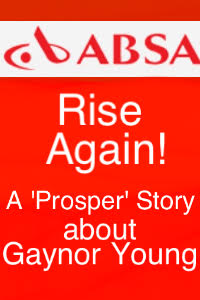I stared at the photograph on Jan’s fridge. It was of a man dragging a woman across the floor by her arm. “That’s from Porgy and Bess,” she said, “Amusing, don’t you think?”
“Amusing! No, I don’t find it amusing. It’s actually abhorrent!”
“Feminism, that’s why I put that picture there, Gaynor, feminism!” She gave dry laugh.
I remembered reading what Billy Jean King said regarding feminism: “I used to walk into a room, and there was never a woman sports writer, never. So it was all guys. I get along great with guys because of my brother, and my dad was a jock, I’m easy‑peasy.
So I go, ‘Okay, before we start, I want each of you guys to tell me what you think a feminist means. What does feminism mean to you?’
You couldn’t believe them. They go (indicating index finger on chin and staring at ceiling). They start thinking. I go, ‘Okay, before we start, I just want to tell you what it means to me. It means equal rights for boys and girls. It’s very simple. It means choice. That’s it. That everybody should have the same opportunities, same rights, easy‑peasy.
I said, Okay, now we can start the press conference.”
“Do you know that often women are still not getting the same pay as men,” Jan said. At this a vivid memory from my past surged before me. I remembered an incident back in my acting days. My agent was speaking to me about my salary which she was negotiating with a producer. “I know that you wanted a certain amount, Gaynor, but he is just not prepared to pay you that. He’s quite adamant. I asked him why he was prepared to give your male counterpart the amount of money that you want and he said that he was prepared to give him that amount because he was a man.”
Talk about ‘red rag to a bull!’ I climbed into my VW and headed straight for the producers office. Once there I demanded to see him. “What is this in connection with?” his secretary enquired. I knew her and liked her but there was no diluting my mood.
“The value that your employer places on people. Men and women.” I literally spat the words at her. “I’ve come to speak to him about my pay!”
“I’m afraid that he asked me not to disturb him this afternoon. He could carry on working well into the night.”
“That’s okay, I’ll wait.”
And I did. Two hours and three cups of tea later I headed for the loo. I was coming out the door when I heard her speaking very sotto voce on the phone. (At this stage my ears worked perfectly!) “She’s still here, sir, and she doesn’t look like she’s making any plans to leave. Alright, yes….” She put down the phone. “Another cup of tea, Gaynor?” I took great delight in that I was depleting his tea stock. “I would love another cup, thanks.”
At a quarter to seven his office door opened and he appeared briefcase in hand. He turned towards me. “You are the most dogmatic and persistent person I know. All right, you will get the money you want. Satisfied?” he said locking his office door.
‘Why were you prepared to pay the male actor that amount without even batting an eyelid? Because he is a man!” I challenged.
“Yes, because he’s a man and has a whole family to feed.”
“For goodness sakes! What is important here is that we are both doing the same job and should therefore be getting the same pay!”
Why do women have to fight for something that should be theirs by right, I wonder?
Around the breakfast table at Jan’s, our conversation continued. I was amazed to hear that in the UK only 147 MP’s out of 650 are female! There has recently been a cabinet reshuffle and everyone thinks it’s marvellous that they now have five female cabinet ministers. Less than 25% Jan told us!
In South Africa, we have a fairly high percentage of female constituents. No, we don’t have 50%. But we out do the British by far. We have 40% females MPs. Bless our wonderful Democratic Constitution.
In America, during that dreadful Civil War, who ever would have dreamed that they would one day have a black President? But still no female President! Maybe Hillary Clinton? Time will tell!
Jan then went on to talk about a popular current affairs programme in the UK, called Question Time. It had a panel of four in which there was always only one woman. Apparently after the program, this “token” woman was always besieged with tweets commenting on her dress, hair or appearance. There was often zilch concerning her answers to the questions. Her actual opinions didn’t seem to count at all. Did the men on the panel receive the same treatment? Oh no, don’t be silly! The men were tweeted about things they should be tweeted about – the comments they had made during the show.
 While I was in England, Wimbledon was on. Wasn’t the men’s final something else! A friend made the comment that women were letting the feminists down by only playing three sets instead of five. And then taking the same amount of prize money. I disagree with this notion.
While I was in England, Wimbledon was on. Wasn’t the men’s final something else! A friend made the comment that women were letting the feminists down by only playing three sets instead of five. And then taking the same amount of prize money. I disagree with this notion.
The origin of women playing three rather than five sets goes back to when sports were run exclusively by men who took the patronising view that women could not possibly compete for as long as their male counterparts. Sure, women’s bodies do not carry the strength of male bodies. But women have proved in marathon races and plenty of other sports that their stamina is just as strong as man’s.
Billie Jean King has been campaigning for the past thirty years for women to have a five set game. Women were perfectly happy to play the longer format but the grand slams would not let them. They were finally allowed equal pay but they are still fighting for their five sets! Are the general public interested in watching five sets of women’s tennis? That is the question.
The expenses to get to Wimbledon standard is the same for men and women. Coaches, Physio, travelling, hotel expenses etcetera, etcetera and etcetera! Why should the men get a bigger prize winning fee than the woman? Because they are allowed to play two sets more?
It is quite interesting to note that a lot of the male players are now advocating a three set match for themselves in The Grand Slam. The five set matches are wrecking their bodies and thereby cutting short their careers.
 A while back I spoke in a blog about what the parents of those missing Nigerian school girls must be feeling. I dread to think of the horror involved for the girls themselves. The Nigerian terrorist group Boko Haram kidnapped 276 girls in order to sell them into sexual slavery to men in Chad or Cameroon. It’s hard to imagine this happening in the 21st century but it has in all it’s dreadful reality. The world should be screaming in outrage about it. Instead people are nervous about covering the subject for fear of “demonising the other.” For goodness sakes! Why are we behaving in such a cowardly “it hasn’t happened to us” manner?
A while back I spoke in a blog about what the parents of those missing Nigerian school girls must be feeling. I dread to think of the horror involved for the girls themselves. The Nigerian terrorist group Boko Haram kidnapped 276 girls in order to sell them into sexual slavery to men in Chad or Cameroon. It’s hard to imagine this happening in the 21st century but it has in all it’s dreadful reality. The world should be screaming in outrage about it. Instead people are nervous about covering the subject for fear of “demonising the other.” For goodness sakes! Why are we behaving in such a cowardly “it hasn’t happened to us” manner?
Nigeria is a modern, fast-growing nation (its economy is now bigger than South Africa’s) and Boko Haram is not in the least bit representative of the Islamic majority. To attack Boko Haram is not to attack the poor Muslims of Africa. It is to attack Boko Haram! Importantly, it is to attack a group who define their opposition to modernity through the way that they treat women. This is one of the most terrifying things about Jihadism. It turns women’s bodies into political manifestos. The emphasis upon the dignity of the individual is something that should strike a chord with those campaigning for women’s rights.
Some people think that we have gone backwards in the women’s feminist fight. I don’t think that we have gone backwards exactly. But we are certainly “treading water”! Women are not content with the way things are, but too often accept the status quo rather that muddying the waters and creating a fuss. We forget that often waters get muddy before the sand settle into new shapes forming clear, sparkling streams. We mustn’t be content and laissez-faire with the way things are. We must still make our voices heard loud and clear. There is still so much that has to be “put right.”
 Dale Spence says: “Feminism has fought no wars. It has killed no opponents. It has set up no concentration camps, starved no enemies, practised no cruelties. It’s battles have been for education, for the vote, for better working conditions, for safety on the streets, for better child care, for social welfare, for rape crisis centres, women’s refuge, reforms in the law. If someone says:”Oh, I am not a feminist,”
Dale Spence says: “Feminism has fought no wars. It has killed no opponents. It has set up no concentration camps, starved no enemies, practised no cruelties. It’s battles have been for education, for the vote, for better working conditions, for safety on the streets, for better child care, for social welfare, for rape crisis centres, women’s refuge, reforms in the law. If someone says:”Oh, I am not a feminist,”
I ask:”Why? What’s your problem?”
Big smile. What is your problem indeed!





















Loved it Gaynor, so true. Lots love
Thanks, Caroline, it was such an interesting blog to work on. With a smile I kiss your eyes
Gaynor
Hit the nail right on the head again, Gaynor. How do you do it? This seems such an old message to be trumpeting about : but it needs trumpeting! Our girl children need a special kind of support these days as the enter the idiotic world of ……. What do you weigh? What do you wear? It is in their teenage years that they must get this message – so that by the time they need to face the question of What am I paying you? they have internalized the message. For us, for society as a whole, we need to keep speaking out, and speaking up – I love your tennis illustrations, sport is a good venue to carry the message. Thank you for this. Xxx
Yes, you’re right, Jane. One can only hope that being and living one’s life a certain way rubs off on others.
Softly I kiss your eyes
Gaynor
No. I am not a feminist, either. I do not agree with the principal of married women holding down jobs that married men should be holding. If we stopped looking at ourselves and demanding, and gave men back what we have tried so hard, and for so long, to grab from them (jobs, rights, pay, etc) they just might rise up and become men, again. Not the washed out mob that has produced effiminate men, too scared to speak out against women. For pete’s sake!! Single women, not living with a man because that is in essence, marriage – should be paid the exact same as single men. And leave the work once you have been married. Let’s build men up, not break them down. However great it makes you feel or look, they are the leaders. They are the ones who should be taking responsibility for our nation. To protect us in war. To guide our families. Let men be men, and rather let women become women – as we should be.
Well said Gaynor! A very powerful message and so very true. Thank you.
Thank you for being such a loyal reader, Romary!
Warmly I kiss your eyes
Gaynor
Dearest Gaynor, you’ve done it again. A brilliant insightful piece about ‘our’ world. It has always baffled me that women should have to ‘fight’ for the rights that males take for granted. I also have a bone to pick with women who break through, then they do not support their sisters’ aspirations, but instead adopt the maleness of their peers, which is a shame.
There is still a glass ceiling, as you point out, for us, in all walks of life.
The irony is that we are the ones who give birth to, and nurture and raise, the very men who keep us at bay. Ha ha !! They have a laager mentality perhaps to keep the mother figures out of their lives, so they don’t need to answer to us ? Compassion and business savvy are not good bedfellows.
Thank you for this blog.
Love,
Mim
xx
You are so right in what you say, sweet Mims!
Gently I kiss your eyes
Gaynor
Comments are closed.